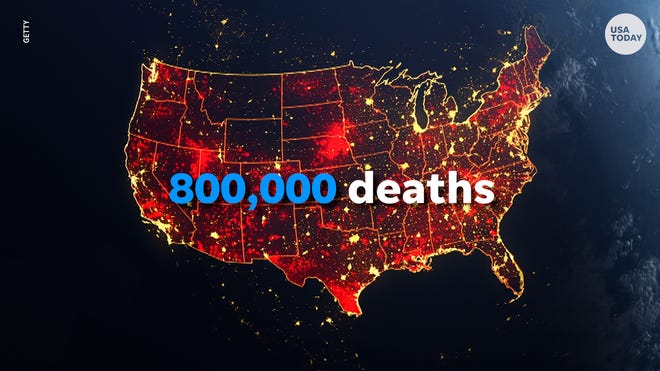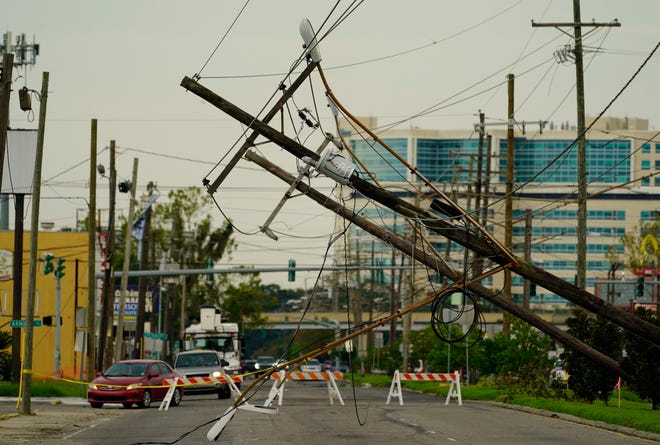
A more contagious but less dangerous variant of the novel coronavirus is in the Cincinnati region. Cases of COVID-19 caused by the omicron variant have been confirmed in Campbell and Kenton counties, Kentucky Gov. Andy Beshear said at a Saturday news conference.
The announcement of the new variant's arrival came days after Cincinnati area hospital leaders warned that rising cases of COVID-19 from the delta variant and the flu had triggered a "dire situation" for the hospitals, due in part to job vacancies created by workers tired out by 21 months of the pandemic. It came one day after Ohio Gov. Mike DeWine said he was sending 1,050 National Guard members to help in the state's beleaguered hospitals.
Cincinnati Children's Hospital Medical Center warned wait times at its emergency rooms were long in a Facebook post on Friday night. It asked parents to check with their child's doctor before heading to an ER or an urgent care center. The post added: "While the hospital is so full, providers may be reaching out to reschedule planned admissions or procedures."
As of Thursday, the last date for which data is publicly available, the Cincinnati region's 40 hospitals had the highest number of COVID-19 cases since January with 620 patients (163 in intensive care and 110 on ventilators). Of the region's 513 intensive care beds, 99% were full, according to the Health Collaborative's Situational Dashboard; 97% of the region's roughly 2,500 medical-surgical beds were full.
Even if omicron is less dangerous, it will still cause a huge number of infections and, therefore, a large number of hospitalizations and deaths, health experts warn. It also will continue to spread to more states and locations. For example, Indiana announced its first confirmed case on Sunday.
Omicron is the latest unrelenting wave of COVID-19 mutations and variations that have left many here and across America emotionally exhausted, dispirited and worried about infections. Its arrival is bringing a renewal of previously issued warnings about the pandemic: get vaccinated or a booster, avoid large gatherings, mask up when indoors and wash your hands frequently.
Cases of COVID-19 have been rising nationally due to the delta variant, with an average of 118,000 new infections a day reported last week.
Locally, a key measure of the pandemic – a rolling average of new COVID-19 cases in the last seven days – is nearing the level in Hamilton County that it was at this time in 2020. The measure has increased 74% in the last week and 210% from three weeks ago, an Enquirer analysis of Johns Hopkins COVID-19 Case Tracker data shows.
"Our hospitals are already filling up. Staff are fatigued," said Dr. Jacob Lemieux, an infectious disease expert at Massachusetts General Hospital, said in a conference call Tuesday with reporters. "We're almost two years into the pandemic, and there may be limits on capacity to handle the kinds of the caseloads that we see from an omicron wave superimposed on top of the delta surge."
Although the omicron variant was identified only the day before Thanksgiving, as more data emerges it is confirming omicron's ability to spread incredibly fast – probably twice as fast as the delta variant, which has dominated the global pandemic since this summer.
"The delta variant really escalated COVID’s transmissibility, and one person with the delta variant might infect up to five other people under the right situations," Dr. Steven Stack, Kentucky's top public health official, said in a news release Saturday. "Omicron now, it may be that one person with omicron may infect up to 18 or 20 other people.”
"At the rate that it seems to be spreading, there isn't a surveillance system on the planet truly that could keep up with it," said Bronwyn MacInnis, director of pathogen genomic surveillance at the Broad Institute of MIT and Harvard University, said on the Tuesday call.
Early data from South Africa's largest private health insurer, Discovery Health, suggests vaccines and prior infections are less protective against omicron than they have been with earlier variants, though they may still prevent severe disease.
Health officials interviewed Sunday recited anew the precautions that Americans should take despite their understandable weariness from the pandemic.
"I know people are tired of this," Dr. Francis Collins, the outgoing director of the National Institutes of Health, said in an interview with NPR's "Morning Edition." "I'm tired of it too, believe me.
"But the virus is not tired of us. It's having a great old time changing its shape every couple of months, coming up with new variants and figuring out ways to be even more contagious," Collins said.
"The one thing that we know from, now, almost two years experience with this virus is that it is really very unpredictable," Dr. Anthony Fauci, the nation's leading infectious disease expert, said Sunday on CNN's “State of the Union.”
USA TODAY and the Associated Press contributed.
Source link








